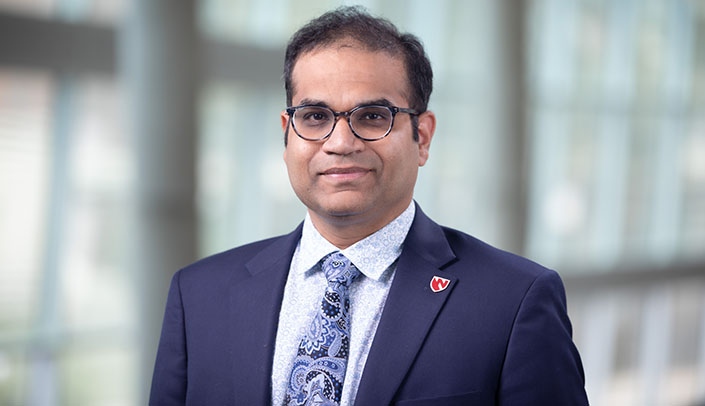Gurudutt ‘Guru’ Pendyala, Ph.D., assistant professor, anesthesiology, wants to crack the mystery of drug addiction.
Research collaboarations
Gurudutt Pendyala, Ph.D., assistant professor, anesthesiology, and his research team are juggling eight interdisciplinary and multi-institutional projects.
- $2.3 million, 5-year National Institutes of Health (NIH) grant to study the role of extracellular vesicles and sex differences associated with relapse in an animal model mimicking methamphetamine addiction (October 2018).
- $419,375, 2-year NIH grant to study inflammation associated with methamphetamine addiction alongside the presence of HIV in the brain (April 2019).
- $458,074, 2-year NIH Cutting-Edge Basic Research Award (CEBRA) grant for collaborative research with Harvard Medical School that uses new diagnostic technology to detect a newborn’s exposure to the opiate pain medication oxycodone (April 2019).
- $1.9 million, 5-year NIH study with UNMC’s Department of Ophthalmology to study the influence of ocular hypertension on neurons and synapses in the visual thalamus (Sept. 2019).
- $50,000 Nebraska Department of Health and Human Services grant to study role of extracellular vesicles associated with nicotine addiction between sexes (June 2019).
- $5,000 1-year Nebraska Center for Nanomedicine grant to study synaptic architecture in pre and postnatal oxycodone exposed offspring using CLARITY (March 2019).
- $30,000 Nebraska Center for Substance Abuse Research pilot grant to develop strategies to attenuate inflammation at the synapse during chronic meth dependency (September 2019).
- $11 million, 5-year Department of Defense grant to study and develop drug therapies to protect military service members from the effect of radiation exposure (January 2020).
- $50,000 Child Health Research Institute (CHRI) grant to identify cord blood extracellular vesicles proteins as biomarkers to screen new borns exposed to intrauterine prescription opioids (January 2020).
A native of Hyderabad, India, Dr. Pendyala completed his masters’ degree in biotechnology from Madurai Kamaraj University where he was a recipient of a scholarship from the Department of Biotechnology, India Ministry of Science and Technology.
He then did his Ph.D. in neuroscience at the University of Fribourg, Switzerland where he was awarded a graduate fellowship from the Swiss National Science Foundation. This was followed by post-doctoral training at The Scripps Research Institute, La Jolla, Calif., and then at UNMC during which he was a recipient of the prestigious Milton Safenowitz Post-Doctoral Fellowship awarded by the ALS Association.
He’s looking at how drugs, particularly opioids and psychostimulants, affect the brain at the molecular and cellular levels. For this novel and well-funded research, Dr. Pendyala will be the 2020 recipient of the Joseph P. and Harriet K. Gilmore Distinguished New Investigator Award.
The award presentation and symposium will take place Tuesday, Feb. 25, at 2:30 p.m. in the Fred & Pamela Buffett Cancer Center, Conference Room 101. Dr. Pendyala will discuss his research in a lecture titled, “Up with Hope – Down with Dope. Drugs: An Equal Opportunity Destroyer.”
“It’s a big honor to be recognized with this award in the name of the legendary Dr. Gilmore, who was the chair of physiology and a visionary in renal and cardiovascular research,” he said.
Dr. Pendyala said the award also is special because of all the close ties and research collaborations between the Departments of Anesthesiology and Physiology.
He first became interested in how the brain works during his doctorate study in neuroscience at the University of Fribourg, Switzerland. His thesis explored how mice carrying a deletion of an important gene regulating daily sleep-wake cycle reacted to alcohol intake. He then followed up in his post-doc study on the synergy of injection drugs of abuse and sexually transmitted diseases on brain function.
“I found my niche in the long term effects of drug abuse,” he said. One focus of his research has been on the role sex differences play in addiction.
“A novel finding is that females progress more quickly to regular use, greater dependence and a higher relapse rate with drugs,” he said. Adding another layer of complexity is the abuse of drugs, especially prescription opioids that easily pass through breastmilk, during and after pregnancy and how it impacts the baby’s brain development.
Dr. Pendyala has zeroed in on two areas: molecular characterization of brain derived extracellular vesicles and application of novel technology based platforms to further detect them in blood plasma for diagnostic purposes. Using both rat model and cell culture based model systems, coupled to state-of-the-art technologies, his research team is interested in identifying these new gene/protein targets including developing them as potential therapeutics.
“I have a wonderful team of researchers and a supportive department and chair, Dr. Steven Lisco. His vision has paid dividends in expanding the basic research program in the clinical department. I also can’t say enough about the university leadership team. Their support is phenomenal.”

Hearty Congratulations Guru. Great achievements in very less time. Wish you more success in future days too!
Congratulations Gurudutt on this remarkable achievment ,, another milestone tat you have achieved . Truly you are an achiever in everyway,, Hats off to you.
Congratulations Guru! Happy for your success.
Great work, Dr. Pendyala! Thank you for your work. Your research will change lives.
Heartiest Congratulations Guru!! Well Done!!
Thank you all for your warm wishes! 🙏